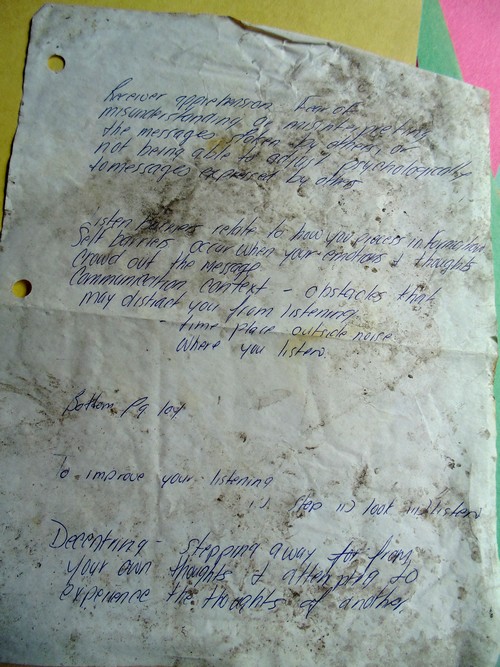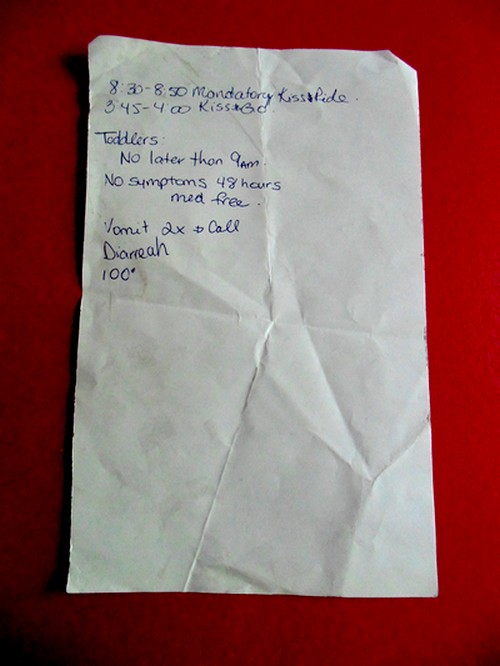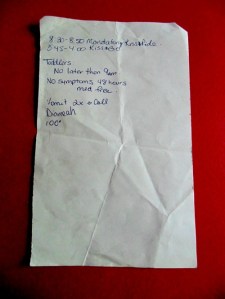Eunice Macfarland opens a carefully folded note and pins it against the kitchen window using a pair of salt and pepper shakers. With the resolve of a decoder, she scrutinizes the handwriting. 782 BERMUDA. Recognition floats along the shores of her memory, but she’s unable to reach the depth where the meaning of the characters resides.
“Raymond,” Eunice calls out in a paper-thin voice. She waits, then calls his name again. A cat drifts into the kitchen, meowing insistently.
Eunice shuffles to the refrigerator and returns to the counter with a left over plate of flaked tuna. When she pushes aside the jumble of soiled dishes littering the Arborite surface, a china cup and saucer slide from their place atop an angled cereal bowl and smash into shards. The jarring sound causes Eunice’s eyes to well up. She fishes a wad of tissue from the wrist of her sweater and dabs under the rim of her glasses. The cup and saucer were a wedding gift from Raymond’s cousin and his wife, Mary. They live in a little town, the name of which Eunice can’t recall.
782 BERMUDA. Why has she been carrying this note in her apron pocket? Her mind stutters like the peevish tractor engine Raymond is forever fiddling with. Whrrr. Whrrr. Whrrr. Three cats wind around her ankles now. They look up at her like old souls that know the answer to her question. Eunice’s lips press into a white line.
The telephone rings in the front parlour.
“Raymond,” she calls as she carries the plate of tuna across the kitchen. “I’m going out now.” The ringing stops and the quiet of the house fills her with unease. “He must be tinkering again,” Eunice explains to the cats apologetically. “Raymond wouldn’t hear a bomb go off if he’s fixing something or working on a puzzle.”
The cats trail after Eunice when she pushes the screen door open. She sets the plate on the porch, then wipes both hands on her apron while the cats devour the tuna. Now that they’ve lost interest in her, she’s free to visit the chickens.
Eunice’s breath punctuates the autumn air in short frothy bursts as she labours across the uneven ground to the barn. 782 BERMUDA. Something about the note rankles her. The tall block letters, so unlike her delicate script. The barely discernible E. Perhaps it’s Raymond’s handwriting. She’ll ask him about it later.
From the doorway of the barn, Eunice sees the lid sitting askew on the chickens’ feed bin. She shakes her head at the scattering of grain and mouse droppings on the ground. It’s the kind of oversight she’d expect from Raymond, yet Eunice is certain it was she who last fed the chickens.
The coffee tin is missing too, the one she uses to carry the chicken feed to the coop. It’s probably on a shelf somewhere holding another of Raymond’s disassembled gadgets. Eunice gathers the hem of her apron with one hand, and with the other, she scoops the feed.
When Eunice opens the door of the run, chickens spill franticly into the barnyard. She disburses grain in elegant arcs. Hens race back and forth, clucking and pecking. They remind Eunice of children scrambling for candy tossed along a parade route. She loves parades. When she was a little girl, Eunice’s mother and father brought her to see an elephant walk down Main Street, followed by a candy-throwing clown dressed in a top hat and a bright red suit. They bought ice cream later. Rum raisin, two scoops, on a waffle cone.
Eunice gathers the last handful of chicken feed from her apron and offers it to a pair of stragglers. They peck at her palm until it’s empty. She thinks of Raymond pecking away as a Morse code operator during World War Two. He enlisted in the Canadian military with his cousin from that little town she can’t name. There’s a photo of herself and Mary with the boys when they were on leave. Eunice is wearing Raymond’s hat tipped rakishly over one eye.
Raymond. He lavishes in the challenge of bending numbers and letters to his purpose. 782 BERMUDA. A thought ignites in the centre of Eunice’s brain like the picture tube in an old television set. The spark grows until it bursts into a fully formed idea.
Eunice hobbles across the yard, up the porch steps, through the screen door, across the kitchen and into the parlour where the rotary telephone waits on a heap of newspapers. She pulls a pen from a bowl of plastic fruit on the coffee table and writes 782 BERMUDA across the top of a classifieds page. Her finger traces the rotary dial and stops at ABC. She records the corresponding number 2. Her heart races as she continues to DEF and number 3. There are only letters R through A to code. A minute later, she giggles at the numbers recorded across the top of the newsprint: 782 2376832.
Eunice takes a deep breath and dials the numbers in succession. A dull warble. Silence. Another dull warble and then, “Hello.”
The voice is familiar.
“Hello?” the man says again. “Is anyone there?”
“It’s Eunice,” she manages to squeak out.
“Oh, for Jesus’ sake, Eunice! Just a minute.” His hand must be covering the mouthpiece. “Mary,” he calls in a muffled voice, “come quick.”
“Who is this?” Eunice asks.
“It’s Will.” He waits then adds, “Will and Mary. Raymond’s cousins from Truro.”
“Oh yes.”
“We were so sorry to hear the news about poor Raymond. It’s so hard when they go — you know, all sudden like that.”
“All sudden …” Eunice repeats.
“Mary and I have been trying to call you since we heard at the end of June. How are you managing?”
Eunice lays the receiver in her lap. She feels like she’s underwater. A disconnected voice implores her from far away.
“Eunice, are you there?”
♦
Gwen Tuinman’s short fiction is included in The Renaissance Anthology and is currently featured in a text and photography exhibit at The Robert McLaughlin Gallery. She is a former member of the Board of Directors for the Writers’ Community of Durham Region and writes for The Word Weaver. She is currently at work on a novel. Research and reflections relative to her works in progress can be found at http://www.gwentuinman.com./
♦♦♦




















